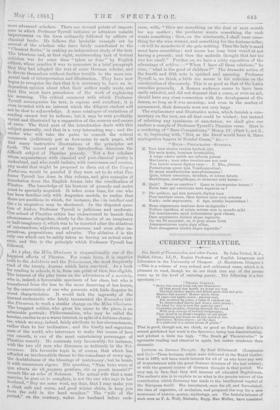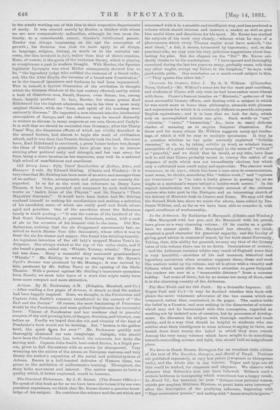Lectures on German Thought. By Karl Hillobrand. (Longmans and Co.)—Theso
lectures, which were delivered at the Royal Institu- tion in 1879, will have much interest for all of us who have any sort of acquaintance with the great German thinkers of tho last century, or with the general course of German thought in that period. We may say, in fact, that they will interest all educated Englishmen. The author's aim is to explain to us what is the precise nature of the contribution which Germany has made to the intellectual capital of the European world. She introduced, once for all, and formulated, the idea of organism, of evolution, and prepared the way for a now treatment of history, poetry, mythology, art. The faithful labours of such men as F. A. Wolf, Niebuhr, Bopp, Max Muller, have consisted
in the steady working.out of this idea in their respective departments of study. It was started mainly by Herder, a thinker with whom we are now comparatively unfamiliar, although he was most dis- tinctly, to a considerable extent, Goothe's intellectual parent. Herder was always impressing on his age the conception of growth ; his doctrine was that we must apply to all things, to language, religion, history, as much as to the material uni- verse, the idea involved in ficri, rather than that of direct creation. Here, of course, is the germ of the evolution theory, which is playing so conspicuous a part in modern thought. With Herder, the Spartan legislator Lycurgus was what Miiller subsequently showed him to be, " the legendary judge who codified the customs of a Greek tribe, not, like the Abb6 Sieybs, the inventor of a brand-new Constitution," as in the times of ignorance and darkness he had been represented. This is, indeed, a typical illustration of the revolution in thought which the German thinkers of the last century effected, and by which a, host of illustrious men, Ewald, Bunsen, oven Henan, too, among them, largely profited. In fact, Herder, for whose genius Karl Hillebrand has the highest admiration, was in his view a moat truly original thinker, while the "form and spirit of his teaching wore eminently German." He imported a now element into the intellectual atmosphere of Europe, and his influence may be traced distinctly in writers so diverse in many respects as our own Grote and. Carlyle. It is well that we should he reminded that Germany, after the Thirty Years' War, the disastrous effects of which are vividly described in tho second lecture, had almost to begin the work of civilisation afresh, and it was then that Prussia distinctly took the lead. She must have, Karl Hillebrand is convinced, a groat future before her, though the ideas of Schiller's generation have given way to an intense striving after political unity and strength, and her vast army, far from being a more incubus on her resources, may well be a national high school of unselfishness and manliness,







































 Previous page
Previous page